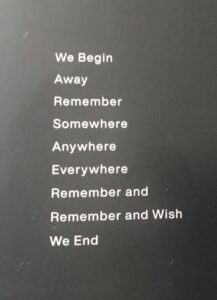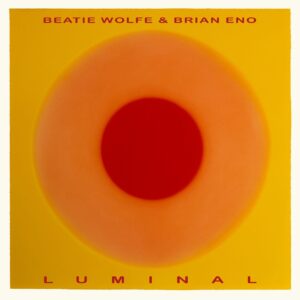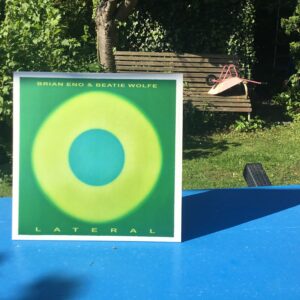Die Gesänge einer Laute
„Jeder, der Davy Graham oder Sandy Bull mag, wird daran große Freude haben.“ Das merkt Richard Williams an zu der „Music for archlute and chitarrone“, solo vorgetragen von Rolf Lislevand auf seiner neuen Cd „Libro primo“. Obwohl die „liner notes“ der Historie und den Geschichten dieser Lautenmusik des 16. und 17. Jahrhunderts ausführlich nachgehen, ist ein kleiner „Crashkurs“ in Sachen Lautenmusik gar nicht erforderlich, um sich in dieser Musik zu verlieren. In einer alten, zu einem Studio umgebauten Scheune im Süden Norwegens, ringsum nur Wald, entstand diese fliessende, in-sich-versunkene Musik. Der Trick beim Hören besteht darin, über die flüchtige Wahrnehmung hinauszugelangen, dass diese alten Stücke doch sehr ähnlich klängen. Es gibt den Kipppunkt des Lauschens, an dem einem die immense Vielfalt bewusst wird, der Zauber im Detail, die emotionale Leichtigkeit und Tiefe all dieser Lieder ohne Worte. Kaum ein Song in diesen Wechselspielen von Erzlaute und Chitarrone überschreitet die klassische Kürze einer guten alten Pop-Single: alles erscheint so transparent wie klar umrissen, und schon damals war es eine Kunst, blossen Zierat zu verbannen und strenges Regelwerk auszuhebeln. Es gibt weitere zwei imaginäre Freunde von „Libro primo“, die mir auf Anhieb einfallen: Bert Jansch und John Renbourne!
“Hello, darkness, my old friend“ – some thoughts on Steve Tibbetts‘ „Close“

Steve Tibbetts‘ new album is sailing stars. It is a kind of shadow play, too. The love of life, the losses. It is glowing from start to end, with two, three explosions along the way. Things can explode in quietude, too, on this haunting melange of electric and acoustic guitars with discreet and, sorry to repeat myself, „glowing“ percussion every once in a while. A thousand miles away from an old hippie‘s shangrila. Hotel California has shut its doors.
The playing of the Minneapolis-based musician is instantly recognizable: it circles around small rhythmic-harmonic sound cells with all kinds of drone sounds and finest beats— and, breathtaking, though never forgetting to breathe: the silences, the minimal zero points, the moments of nothing lasting fractions of a second or two.
„CLOSE“ is like a dark Rothko painting on fire, in purely metaphorical and sensual ways. The tracklist reads like a Samuel Beckett poem. And, in regards to these invocations, I ask myself: how can something „noir“ like this be so elevating, so heartwarming?!
And now, a mood line, and a timeline with a twist:
Pharoah Sanders has made „TAUHID“, Jan Garbarek has made „DIS“, Van Morrison has made „VEEDON FLEECE“, Julian Priester has made „LOVE, LOVE“, Julie Tippetts has made „SUNSET GLOW“, David Darling has made „CELLO“, Laurie Spiegel has made „THE EXPANDING UNIVERSE“, Arve Henriksen has made „CHIAROSCURO“, Bill Callahan has made „APOCALYPSE“, Lambchop has made „SHOWTUNES“, and Steve Tibbetts has made „CLOSE“.
Glowing affairs all of them. Honestly, this album breaks my heart.
Michael Engelbrecht, Deutschlandfunk

Steve speaking:
Steve Tibbetts: guitar, percussion, piano
Marc Anderson: percussion, gongs, handpan, loops
JT Bates: drumsBrian Eno and Beatie Wolfe go „Liminal“
„A quiet life where
We can blend
Hidden thoughts
With sweet lament“
(from Shudder Like Crows)A manageable arsenal of instruments, essentially synthesizer and guitar. Two defining instruments of rock history—and nothing seems to have been told to an end yet. If anything has completely disappeared from the duo’s expeditions, it is tempo, action, and turmoil. Everything, including the vocals, is imbued with slowness, a sense of adventure and the unknown.
But first things first: after their song cycle “Luminal,” a kind of “electric country dream music” in which the private and the political are closely intertwined in dark times; after the purely instrumental large-scale composition “Lateral,” with its subtly eerie prairie spaces, Brian Eno and Beatie Wolfe now present their third coup. “Liminal” is an exciting collection of immensely rich “instrumentals,” songs, song-like pieces, and the thin places in between. Each composition reveals a different sphere: lament, primeval fantasy, dream story, at one time probably the most verbose breakup song in recent pop history, set in a laundromat! Or is the narrator just caught in a dream? “Liminal” surprises at every turn.
„And we know / what it means to be dust / Watch it sleep / In the last part of us“. Although we are confronted time and again with finitude, decay, and darkness, in verses that pose many a riddle and could serve here and there as new koans for Zen students, it is quite an uplifting experience to dive into these breathing things and sounds. With Eno being a kind of nighttime painter with a knack for „the soul in the machine“, the guitar, folksy and meditative, is no miles and moons away from legendary campfire moods: a quiet joy, and more than a quantum of solace.
The voice, close-miked, has an unexpected range of intimacies to offer, but is not really reliable, coming along like an uncanny entity, ghost-like, a figure from a dream, a meditation on human fragility, a delicate splash of colour. What a seamless balance between the moments on the brink, and the almost warm-hearted adventures with „oceanic“ vibes in between! Exit strategies for sheer amazement are hard to find on this visionary, wild and strangely relaxed ride!
Michael Engelbrecht, Deutschlandfunk
„Something stranger“ – the ongoing flow of Eno & Wolfe on „Liminal“
Ein überschaubares Arsenal von Instrumenten, im wesentlichen Synthesizer und Gitarre. Zwei prägende Instrumente der Rockhistorie – und nichts ist offenbar zuende erzählt. Wenn etwas aus der Musik des Duos völlig verschwunden ist, dann Tempo, Action, und Aufruhr. Alles, auch der Gesang, macht sich immense Langsamkeit zueigen. Die Ruhe der Ausführung behindert allerdings nicht das, wiederum zu den Zutaten und Mythen der Rockgeschichte zählende, „berauschende Hören“.Aber eins nach dem andern: nach ihrem Liederzyklus „Luminal“, einer Art „electric country dream music“, in der das Private und Politische nah beieinander sind in unseren dunklen Zeiten; nach der rein instrumentalen Grosskomposition „Lateral“, mit ihren subtil unheimlichen Prairieräumen, liegt nun der dritte Streich von Brian Eno und Beatie Wolfe vor. „Liminal“ ist keine harmlose Restesammlung, vielmehr eine spannende Abfolge von immens reichhaltigen „instrumentals“, Songs und Songartigem. Jede der elf Kompositionen enthüllt eine andere Sphäre: mal Lamento, mal urzeitliche Fantasie, mal das in einem Waschsalon angesiedelte, wohl wortreichste Trennungsstück der jüngeren Pophistorie! „Liminal“ überrascht an allen Ecken und Enden.
Obwohl wir hier ein ums andere Mal mit Staub, Endlichkeit, Verfall und Nacht konfrontiert werden, in Versen, die manches Rätsel aufgeben und hier und da als neue Koans für Zen-Schüler dienen könnten, ist es eine seltsam erhebende Erfahrung, diese unbekannten Orte aufzusuchen. Die Gitarre, folkig, meditativ, ist nicht so weit von den alten Lagerfeuern entfernt: eine reine stille Freude, mehr als ein Quantum Trost in den dunklen Räumen ringsum.
Und was für eine seltsame und nahtlose Balance zwischen den Momenten am Abgrund, und beinah warmherzigen Abenteuern mit ozeanischen „vibes“ dazwischen! Die einzige Möglichkeit, aus dem Staunen herauszukommen (wenn man einmal Feuer gefangen hat für diese elementare Klangwelt aus Gitarre und Elektronik und Stimme und wenig mehr), besteht darin, sich der Versuchung zu entziehen, das Album wieder und wieder anzuhören! Aber warum sollte man!?
(Michael Engelbrecht, Deutschlandfunk)

Im folgenden erzählt Beatie Wolfe, gewohnt markant, etwas über ihre gemeinsame Arbeitsweise, und über den Song „Shudder Like Crows“, der ein perfektes, ergreifendes Finale für „Liminal“ abgibt, ein Werk, das alles andere als eine Resteverwertung ist, und in 11 Kompositionen elfmal die Landschaft verwandelt, den Ton, die Stimmung, die Gefühle. Ein Kreis schliesst sich mit „Liminal“ zu dem vor 50 Jahren erschienen Album „Another Green World“, auf dem Eno erstmals Ambient und Song mischte.
The story behind „Music For Films“
In jenem legendären, einsamen Sommer (oder war es schon Herbst), in dem „Music For Films“ erschien, lebte ich in einer leergeräumten Wohnung, in der die Schatten einer alten Liebe noch an der Wand tanzten. Allmonatlich kaufte ich die „Sounds“, die beste Musikzeitschrift der alten Bundesrepublik. Ich stöberte durch die jüngste Ausgabe, als mein Blick auf eine kleine Werbung der Firma Polydor fiel: „Der Mann im Hintergrund“, war da zu lesen, so flüstert es mir meine Erinnerung ein, ein monochromes graues Cover war abgebildet – Music for Films wurde mit kalkuliertem Understatement verkündet. Sofort bestellte ich die Platte bei einem meiner zwei Dealer, in Unterlüss. Der andere Postversand war Jazz by Post in der Gleichmannstrasse 10 in Pasing, von dort kamen mir über Jahre u. a. viele ECM-Neuheiten ins Haus, die Schatztruhe der 70er Jahre war weit geöffnet. Unterlüss war für die Rockmusik und ihre Ränder zuständig. Zwei, drei Tage später hielt ich Music for Films in Händen. Und hörte sie zum ersten Mal.

Ich habe diese Platte mit ihren flüchtigen und mich auf jede Flucht mitnehmenden Skizzen, ihren vollkommenen Unfertigkeiten, ihren Sehnsuchts- und Angst- und Traumstoffen seither unendlich oft gehört, bewusst, unbewusst, im Hintergrund, im Seitengrund, Im Vordergrund. Beim Wandern (mit Knopf im Ohr), beim Schreiben, beim Einschlafen, Wachwerden, in der Fremde. Und als Alternative für „die Zigarette danach“. Beim ersten Hören wusste ich damals schon, 1978, dass diese Musik lebensbegleitend sein würde. Sie wurde rasch auch eine Medizin, sie half mir, mit den nackten Schatten an der leeren Wand zu tanzen, statt sie zu verscheuchen.
Und als damals ein Riese mich aus dem Bett und meiner Wohnung im 7. Stock schleudern wollte, ich meinen Geist vergeblich mit Kakao zu beruhigen suchte, der Alptraum aber wiederkehrte, und ich mir einen heißen Grog machte mit dem guten alten Pott, mit dem Auto auf einen großen leeren Acker in der Nähe von Würzburg fuhr, dort den Sonnenaufgang erlebte und meine einzige tief anrührende Begegnung mit einer Kantate von Bach aus dem schräpigen Autoradio hatte, und hernach in die Alpdruckwohnung heimkehrte, legte ich Music for Films auf, und erlebte, wie sich die vollkommen irrationalen Glücksgefühle, die sich schon auf dem kühlen Morgenacker aufgetaucht waren, weiter ausbreiteten, und ich mich gar freute auf die nächste Begegnung mit dem Riesen.
(Wer ganz oben auf „The Story“ klickt, hört, was Brian Eno mir vor ein paar Jahren über „Music For Films“ erzählte, und wie eng die Musik mit den Aufnahmesessions von „Another Green World“ verknüpft war. Es ist ein Fakt, dass kein Album öfter in den Klanghorizonten von mir in all den Nächten zwischen 1990 und 2021 gespielt wurde als diese beiden. Es ist ein Fakt, dass ich in meinem Leben kein Album öfter gehört als diese beiden.)

„The passage of time
Is flicking dimly up on the screen
I can’t see the lines
I used to think i could read between
Perhaps my brains have turned to sand““Luminal“ & „Lateral“
„Lieben oder hassen?! Ich liebe die Musik von David Sylvian. Einige seiner Songs sind für mich zeitlose Klassiker. Mit Melanie Dalibert ist es allerdings ganz anders, die Musik überlebt bei mir keine Minuten. Wenn ich lese, was David Sylvian über seine Zusammenarbeit mit Melanie schreibt, ist meine Reaktion: Wieso höre ich das nicht? Bin ich zu sehr mit dem Virus Jazz infiziert, um von dieser Musik noch erreicht zu werden? Übrigens geht es mir mit Brian Eno und seiner Musik der letzten Jahre genauso. Dafür muss ich wohl im Seniorenheim leben.“ (radiohoerer henry)

Flowworker: ***** („Luminal“) & **** („Lateral“)Warum ich noch nicht über das Büchlein „What Art Does“ von Brian Eno und Bette A. geschrieben habe, ist rasch erzählt: ich bin allzu vertraut mit all den Gedanken über Kunst, Feelings, Surrender, Play, etc. die Brian in dieser „unfinished theory“ ausbreitet, nach seinem Anspruch so verständlich, dass es auch nicht auf den Kopf gefallene Teenager verstehen können, und herrlich bunt bebildert ist es zudem! Wäre ich Kunstlehrer, wäre das Stammlektüre in meinen Klassen. Ab und zu schmökere ich mit Vergnügen in dem Bändchen.
Viel lieber aber begegne ich der Kunst ohne Metaebene, lasse die Feelings durch mich hindurch strömen und rauschen, wenn ich „Luminal“ oder „Lateral“ auflege, Brian Enos famose neuen Alben mit Beatie Wolfe, und erlebe da, ungefiltert, Surrender, Play, etc., in allen Schattierungen zwischen dem Unerhörten und dem Unheimlichen, zwischen dem Fest und den Erschütterungen des Lebens. Denn all das dringt hier durch, und viel zu fesselnd, in diesen Wochen, um kluge Worte darüber verlieren zu wollen.
Das Erlebnis der Tiefe spielt sich stets im Zwischenraum von Sender und Empfänger ab, und hier, bei den elf Songs von „Luminal“ etwa, bringe ich es schlicht und ergreifend so auf den Punkt, dass mein mutmassliches Songalbum des Jahres 2025 mich so tief erwischt, berührt, umfängt, umgarnt, verführt, auf gut deutsch „haunted“, dass es seinen Platz findet neben meinen Songalben der letzten beiden Jahre von Beth Gibbons und P.J. Harvey. „Luminal“ ist ein Album, das Tore öffnet, tief taucht und, mich jedenfalls, auf seltsam diskrete Weise, mitreißt!
P.S. I never got an interview in the years of „virtual conversations“ (the artist in an empty room (no „Zoom“, no „phoner“) that was technically so perfect (the icing on the cake). And her answers: interesting from start to end and „to the point“! You can listen to her solo talk from Brian Eno’s studio in Notting Hill until the end of September HERE!
In meinem Lieblingspark

Ich habe im Jardin du Luxembourg auf einer großen grünen Wiese „Causeway“ gehört, nicht weit von dem Teich, wo Gross und Klein Miniboote auf kleine Fahrten schicken, aus dem bald erscheinenden Album „Disquiet“ der Necks. Wunderbar, von „Unruhe“ in diesen zeitlosen 26 Minuten keine Spur! Das Wetter wie eine gemalter Sommer an diesem langen Wochenende, erst zum Ende von „Causeway“ zogen dichtere Wolken auf, bald würde heftiger Regen folgen, wir winkten ein Taxi herbei. Noch immer schweben mir die Klänge durch den Kopf – ein Hauch der frühen Jahre von Caravan. Richtig interessant würde diese kurze Kurzgeschichte, wenn ein zweiter Hörer irgendwann auftaucht und im gleichen Park das gleiche Musikstück hört. Wo sitzt er oder sie? Welches Wolkenspiel zeigt der Himmel? Und was löst die Musik aus? Sicher nicht das Wort, das die Necks ihm gaben: „Damm“. Oder „Dammweg“. Und während ich meinen Platz auf der belebten Wiese suchte, voller glücklich leuchtender Zeitabschnittsgefährten (vertieft im Spiel, in der Liebe oder der Routine), schweifte, auf dem Weg dorthin, mein Blick nah wie fern, um jenen Steinbrunnen zu finden, wo einst ein Girl, jung wie ich, 1972, in einem anderen Sommer, „Ohio“ sang, von Crosby, Stills, Nash & Young. Diese beiden Stücke würden, zusammen mit der Schneemusik des Parks im Dezember 1992, als ich Tamia und Pierre Favre besuchte im Jüdischen Viertel, den Soundtrack meines Lebens im „Jardin“ abbilden.. Mir fiel sogar eine Szene aus einem Eric Rohmer-Film ein, der hier natürlich zu gerne seine jungen Sinnsucher manche Runde drehen liess. (m.e.)
„Reviewing reviews“
Not one but two new Brian Eno albums to aurally digest, each made in collaboration with conceptual artist Beatie Wolfe.Lateral brings to mind Eno’s past outer space-related ambient endeavours with younger brother Roger and Daniel Lanois, but with Wolfe’s involvement the album seems to be more of a sonic comfort blanket to wrap oneself up in whilst gazing up at the stars… or wishing one was up there with them. As for Luminal,it’s very much a sister album to Lateral. Wolfe has written its lyrics, and also sings on these 11 songs, which are produced magnificently by Eno. Think luscious dreampop with shades of a country twang and you will be close to what is achieved on this album. The instrumental Lateral and vocal tracks of Luminal are each as captivating as they are deeply moving, and both albums complement each other very nicely too. (David Nobakht)

Icn sammle derzeit, im Netz, Besprechungen der beiden Alben „Luminal“ und „Lateral“ von Beatie Wolfe und Brian Eno bzw. Brian Eno und Beatie Wolfe. Ein knappes, gutes Dutzend ist derzeit verfügbar, etliche werden noch folgen. Neben wenig überraschenden „appraisals“ von den üblichen Eno-Berichterstattern Wyndham Wallace und mir, finden sich respektvolle wie bewundernde, ja, begeisterte Besprechungen vor allem des Songalbums. Eine klare Tendenz, auch wenig überraschend: der Songzyklus wird generell positiver bewertet, mitunter hymnisch gefeiert; das „Ambient-Opus“ bekommt, je nach Standpunkt, das polemische oder das leicht gelangweilte oder faszinierte „Echo“, im Grunde, wie es bei „Ambient Music“ seit „Ambient 1“ (1978) der Fall ist. Ich möchte, wenn ich genug gesammmelt habe (niemand muss mir was schicken, ausser, Jan R., wenn da was in der New York Times zu lesen ist!), die Besprechungen von „Luminal“ besprechen. Zwei Dinge noch: einmal gibt es seit gestern, das in den Klanghorizonten im DLF als „Premiere“ gespielte „Play On“ als Video – HIER – und, zum zweiten, die „lyrics“ von „Play On“, bei den „comments“… (Michael Engelbrecht / Foto: Manuela Batas)
“the lateral and luminal surrender experience“
In regards to „Luminal“, surely one the most beautiful albums of 2025, there is only one reason I don‘t come up with the minor quibble that Brian Eno isn‘t doing the lead vocals, and that is the voice of Beatie Wolfe! (Michael Engelbrecht, Deutschlandfunk)
Warum ich noch nicht über das Büchlein „What Art Does“ von Brian Eno und Bette A. geschrieben habe, ist rasch erzählt: ich bin allzu vertraut mit all den Gedanken über Kunst, Feelings, Surrender, Play, etc. die Brian in dieser „unfinished theory“ ausbreitet, nach seinem Anspruch so verständlich, dass es auch nicht auf den Kopf gefallene Teenager verstehen können, und herrlich bunt bebildert ist es zudem! Wäre ich Kunstlehrer, wäre das Stammlektüre in meinen Klassen. Ab und zu schmökere ich mit Vergnügen in dem Bändchen. Viel lieber aber begegne ich der Kunst ohne Metaebene, lasse die Feelings durch mich hindurch strömen und rauschen, wenn ich „Luminal“ oder „Lateral“ auflege, Brian Enos famose neuen Alben mit Beatie Wolfe, und erlebe da, ungefiltert, Surrender, Play, etc., in allen Schattierungen zwischen dem Unerhörten und dem Unheimlichen, zwischen dem Fest und den Erschütterungen des Lebens. Denn all das dringt hier durch, und viel zu fesselnd, in diesen Wochen, um kluge Worte darüber verlieren zu wollen. Das Erlebnis der Tiefe spielt sich stets im Zwischenraum von Sender und Empfänger ab, und hier, bei den elf Songs von „Luminal“ etwa, bringe ich es schlicht und ergreifend so auf den Punkt, dass mein mutmassliches Songalbum des Jahres 2025 mich so tief erwischt, berührt, umfängt, umgarnt, verführt, auf gut deutsch „haunted“, dass es seinen Platz findet neben meinen Songalben der letzten beiden Jahre von Beth Gibbons und P.J. Harvey. „Luminal“ ist ein Album, das Tore öffnet, tief taucht und, mich jedenfalls. einfach mitreißt!

Why I haven’t yet written about the little book ‘What Art Does’ by Brian Eno and Bette A. is easy to explain: I am – after so many interviews and lectures – all too familiar with all the thoughts about art, feelings, surrender, play, etc. that Brian expounds in this ‘unfinished theory’, which he claims is so comprehensible that even teenagers who haven’t fallen on their heads can understand it, and it is also wonderfully colourfully illustrated! If I were an art teacher, this would be standard reading in my classes. I enjoy browsing through the book from time to time. But I much prefer to encounter art without a meta-level, to let the feelings flow and rush through me when I put on ‘Luminal’ or ‘Lateral’, Brian Eno’s famous new albums with Beatie Wolfe, and experience there, unfiltered, Surrender, Play, etc., in all shades between the unheard and the uncanny, between the celebration and the darker waves of life. Because all of this comes through here, and far too captivating, to want to lose clever words about it. In the moment. The experience of the profundity of art always takes place in the space between sender and receiver, and here, with the eleven songs of ‘Luminal’, for example, I simply get to the heart of the matter in such a way that my presumed song album of the year 2025 catches me so deeply, touches, embraces, ensnares, seduces, haunts, that it finds its place alongside my song albums of the last two years by Beth Gibbons and P.J. Harvey. „Luminal“ is an album that opens gates, dives deep, and simply elevates! At least that happens to me!„Grosses Leeres Land“

Parallel zu dem Songalbum „Luminal“ von Beatie Wolfe und Brian Eno erscheint am 6. Juni, als LP, CD, und DL, das Instrumentalalbum „Lateral“, mit der Komposition „Big Empty Country“: in der Vinyledituon heisst Seite A „Big Empty Country (Day), und Seite B „Big Empty Country (Night)“. Einmal mehr öffnet dieses Ambientwerk eine ganz eigene Atmosphäre, die zwar unverkennbar Enos Handschrift trägt, aber eben einen weiteren unerhörten Raum öffnet, insofern nur strukturell vergleichbar ist mit Grosskompositionen wie „Discreet Music“, „Thursday Afternoon“, „Lux“, oder „Reflection“. Der Titel „Big Empty Country“ ist mit Bedacht gewählt, und impliziert (mein ganz privater Höreindruck) sowohl das Unheimliche wie das Unberührte, das Pittorekse wie das Postapokalyptische. Der Klang der Gitarre, die hier und da ihre Spuren hinterlässt, ist pure Reminszenz ohne Nostalgie. Mehr wird nicht verraten. (m.e.)Once again, this ambient work opens up a completely unique atmosphere that bears Eno’s unmistakable signature, but opens up another unheard-of space that is only structurally comparable with major compositions such as “Discreet Music”, “Thursday Afternoon”, ‘Lux’ or “Reflection”. The title “Big Empty Country” was chosen with care, and implies (my very private impression) both the uncanny and the untouched, the pittoresque and the post-apocalyptic. The sound of the guitar, which leaves its mark here and there, is pure reminiscence without nostalgia. (m.e.)